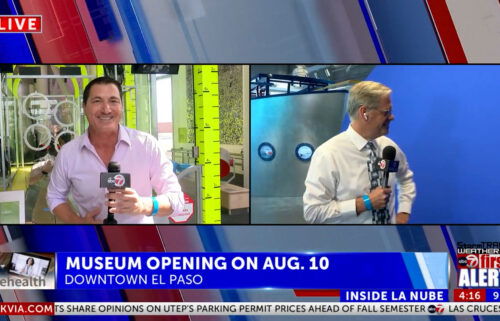‘It felt like forever’: Family questions 17 minute ambulance response time
Click here for updates on this story
Denver, CO (KCNC) — A Denver family is questioning why it took 17 minutes for a Denver Health ambulance to arrive at their southwest Denver home after they called 911. In December, their infant daughter stopped breathing.
“It just felt forever until they got there,” said Javier Barraza of the incident Dec. 20 involving his daughter, Sofia. “I don’t wish this on nobody’s family –what me and my fiancé went through,” said Barraza.
Sofia, who was less than 2 months old, was pronounced dead at Denver Health Medical Center shortly after she arrived.
Denver Health data shows, in 2019, the average ambulance response time to the zip code where Sofia Barraza stopped breathing was less than six and a half minutes. In this case, it took 17 minutes for an ambulance to arrive. The 17 minutes is also nearly twice as long as the nine minute goal set in the contract between the city of Denver and Denver Health Medical Center.
“It’s sad. It’s horrible. Nobody wants this to happen,” said a spokesperson for Denver Health Paramedics.
According to dispatch reports, interviews and other data accessed by CBS4, Sofia Barraza’s mother, Janet Cruz, called 911 from her home on South Knox Court at 5:17 p.m. after she discovered her daughter was not breathing. The home is just more than three miles from Denver Health Medical Center and is typically about a nine minute drive from the hospital.
But, there were no ambulances at the hospital that could respond, according to hospital administrators.
Records show a Denver Fire department crew, from a station blocks away from the South Knox Court home, was on scene within four minutes. They performed CPR and attended to the infant, but are not equipped to transport patients.
So it would be another agonizing 13 minutes before a Denver Health ambulance arrived on scene.
Cruz, who is deaf, communicated with CBS4 through a sign language interpreter.
“I was scared to death. I didn’t want to lose her. She was my daughter,” said Cruz. “I was crying. I wanted my daughter to live, I didn’t want to lose her.”
Barraza had been working that day, but rushed home.
“I was scared. I didn’t want to lose my daughter,” said Barraza. “That time felt like forever, like an hour and a half just waiting for the ambulance to pull up.”
The Denver Health Paramedic Division explained that what happened that Friday afternoon was extraordinarily rare. They said on a typical Friday afternoon, they would have 20 ambulances around the city and perhaps 17 calls for ambulance service.
However, they said from 4 p.m. to 5 p.m. that afternoon, there were 28 calls for ambulances. Combine that with heavy traffic around Denver, and they called it “a perfect storm” that led to an overtaxed ambulance system that could not keep up.
“Nobody wants this to happen,” said the paramedic division spokesperson.
He said the paramedic division “struggled” with response times in 2019, and did not meet compliance goals, but the Barraza case stands out as one of the longest delays.
On Dec. 20, with no Denver paramedic ambulances available, a private ambulance was initially scrambled and sent toward the infant cardiac arrest call. When it was near the Barraza home, another emergency call came in, and the private ambulance was diverted to that call.
A Denver Health ambulance – which was then about five miles away – was then dispatched to the South Knox Court address at 5:27 p.m., adding to the delay.
An autopsy report for Sofia Barraza by the Denver Coroner’s Office concluded, “It appears, most likely, the baby died from her underlying genetic condition. The exact mechanism is unclear, but could be related to apnea or possibly seizures.”
Still aching from his daughter’s death, Barraza told CBS4, “I hope they don’t do this to someone else. I hope they get it back on track the way it’s supposed to be.”
Denver Health says it has made a number of changes with scheduling and logistics to try to prevent any more delays like in the case of Sofia Barraza.
Please note: This content carries a strict local market embargo. If you share the same market as the contributor of this article, you may not use it on any platform.




